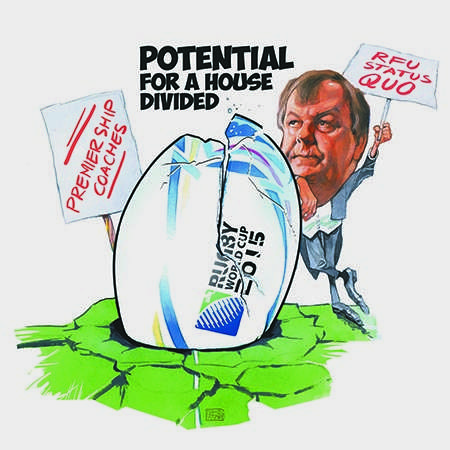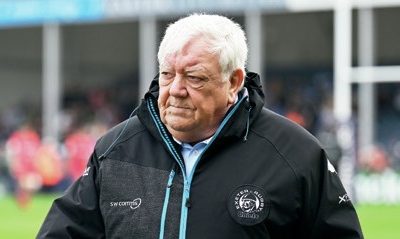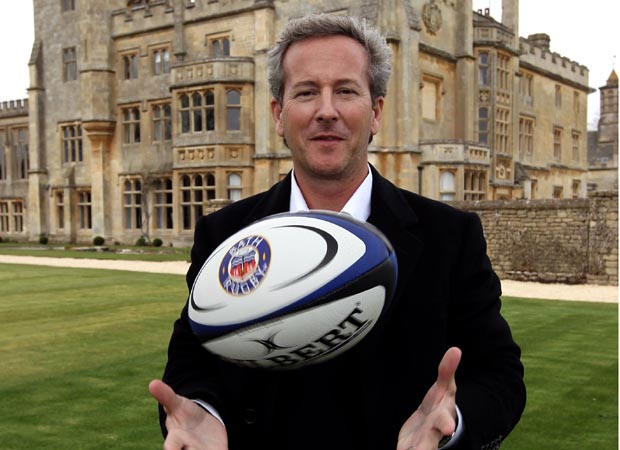
 This week there was an unavoidable sense of Stuart Lancaster as a hard-working but beleaguered schoolmaster trying in vain to keep control of an unruly classroom. There was also a growing fear that the RFU politicians who are trying to protect their own positions, and that of the head coach, by initiating a drawn-out review process – for which terms of reference have yet to be announced – are blind when it comes to reading the mood of the majority of the English rugby public.
This week there was an unavoidable sense of Stuart Lancaster as a hard-working but beleaguered schoolmaster trying in vain to keep control of an unruly classroom. There was also a growing fear that the RFU politicians who are trying to protect their own positions, and that of the head coach, by initiating a drawn-out review process – for which terms of reference have yet to be announced – are blind when it comes to reading the mood of the majority of the English rugby public.
They are in danger of causing a deep schism in the game in this country, and casting a long shadow over this World Cup, if they do not announce a plan of action – and stick to it. No-one is suggesting that they should deliver a new coaching team before the middle to end of November, however, they are duty bound to make a decision on what happens to the existing regime as soon as possible after England close their 2015 World Cup account against Uruguay.
If they do not, England’s internal strife will fester for the remainder of the tournament, and beyond, with the image of the game in this country tarnished and the leading figures in an around the England camp under increasing pressure to act.
There are many, myself included, who believe that while a review may be worthwhile it should not stand in the way of what we have seen with our own eyes. Namely, that this England coaching regime and squad failed abjectly to reach their own targets, and, given the massive resources available to them, made a humiliating exit from the tournament they were hosting.
Those results – and those preceding them over the last four seasons – are all the grounds that the RFU chief executive, Ian Ritchie, needs in order to call for the resignation of the coaching team en bloc, and also that of Rob Andrew, the performance director who was instrumental in Lancaster’s appointment. He does not need to canvas England squad players who, having been picked by the head coach, could be considered to have a vested interest in him being retained.
Then there is the question of the high standards that have gone west. Indiscipline on and off the field has marred England’s 2015 World Cup campaign – which after the binge-drinking excesses of 2011 was meant to be squeaky clean – and they reached a nadir on Friday with the banning order served on assistant coaches Andy Farrell and Graham Rowntree for breaching communication protocols with match officials during England’s 33-13 rout by Australia last weekend.
Farrell and Rowntree were banned from the changing room and tunnel area for the final match against Uruguay for the crucial periods before the kick-off, during half-time, and for 10 minutes after the game. Graham Mew, the Canadian RWC disciplinary officer, issued a warning and reprimand to both England’s assistant coaches.
 Mew dismissed Farrell’s statement that it was “an insignificant incident” finding instead that Farrell had used, “a raised voice in an aggressive manner” in comments directed at assistant referee Marius Mitrea, forcing the other assistant referee, George Clancy, to intervene.
Mew dismissed Farrell’s statement that it was “an insignificant incident” finding instead that Farrell had used, “a raised voice in an aggressive manner” in comments directed at assistant referee Marius Mitrea, forcing the other assistant referee, George Clancy, to intervene.
Mew’s statement that Farrell and Rowntree – who were upset by the high penalty count against the England scrum – “were disrespectful to the match officials concerned and wholly inconsistent with rugby values”, was jarringly at odds with the mantras of discipline, team culture, and humility, which Lancaster has extolled throughout his tenure as head coach.
You would have to have a heart of stone not to feel for Lancaster, and his squad, given the magnitude of their fall from grace in the space of a week. However, it is the head coach who bears the brunt, and his personal grief was felt keenly by his elite coaching counterparts when they gathered at The Stoop on Wednesday for the launch of the new Premiership season.
The highly-rated Exeter Chiefs head coach Rob Baxter, who worked with Lancaster on the 2013 Argentina tour as England forwards coach while Rowntree was with the Lions, made his discomfort clear. “I’d like to think I know Stuart pretty well, and I’ve felt pretty uncomfortable with all of it. One of the saddest things for me was seeing Stuart after the Wales and Australia games. They’ve been horrible moments, and they’ve spoiled the World Cup for me.”
Dean Richards, who has the most impressive CV of any Premiership coach courtesy of his two European Cup titles with Leicester and the rebuilding job he did with Harlequins pre-Bloodgate, was another who said he would not be joining any “Lancaster must go” bandwagon.
The Newcastle Falcons rugby director was not alone. In fact, none of the Premiership coaches were prepared to advocate that Lancaster should be dismissed by the RFU, and those who did show any interest in an England job all pointed to the horizon rather than immediate involvement.
Judging on past form when changes in England’s coaching regime have been in the offing, these sometime-in-the-future statements should be taken with a block of salt.
Yet, when it came to taking issue with what Lancaster and company did with their players, and those from other clubs, many of the Premiership coaches did not spare the lash (see Page 6). Baxter talked about a squad devoid of vibrancy, saying, “What we’ve seen is very little enjoyment, smiles or characters…they’re all different men and different characters, but we haven’t seen them come through as themselves.”
Baxter said also that he was puzzled by the strategy on the pitch, and the Bath fly-half, George Ford, being dropped from the starting side in the decisive games against Wales and Australia.
“If I’d have been in charge and backed George Ford for that length of time, in the performances he played in, and then change him at almost a moment’s notice, it seems odd to me. But this is where we’ve all got to be careful not being armchair critics, because we weren’t in the middle of the camp…George might have had his three worst training sessions in the build-up to that match. We just don’t know. But from the outside, it seems surprising to make that change, especially as George had played in the win over Wales previously. It wasn’t like it had been proven he couldn’t do the job.”
The reality is that no-one in this sport wants to see men like Lancaster, Farrell, Rowntree and Mike Catt kicked when they are down – but they have had their chance at Test level for the moment, and their record is simply not good enough for them to continue.
If England have real aspirations to win the World Cup in 2019 the right thing to do is to cauterize the wound now, and let the healing begin.


Latest News
Super Rugby Americas: Round Ten Review

British and Irish Lions
British and Irish Lions: Biggest winners and losers from Andy Farrell’s selection
























You must be logged in to post a comment Login